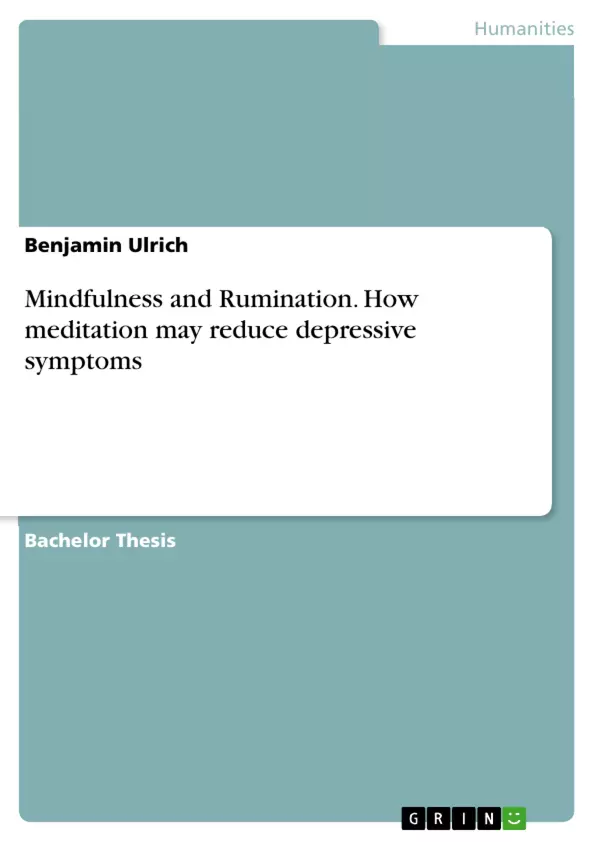Die Arbeit erkärt einige wichtige Begriffe zum Thema Meditation und Depression. Anschliessend werden ca. 10 Studien analysiert. In der Zusammenfassung werden die Ergebnisse in ihrer Verschiedenheit voneinander relativiert. Ich diskutiere zuletzt einige Ansätze, die zukunftsweisende Trends in der Wissenschaft der Psychologie aufweisen.
Table of Contents
- Summary
- Introduction
- Theory
- Mindfulness and decentering in MBCT
- Cognitive models of depression
- Defining rumination
- Research questions
- Results
- Mindfulness and rumination
- Mindfulness and decentering
- Mindfulness vs. other treatments
- Mindfulness in schizophrenia and ADHD patients
- Discussion
- Research summary and conclusion
- Critics
- Future outlooks
- References
- Appendix
- Literature research
- Credits
- Adresses
Objectives and Key Themes
This paper examines the potential of mindfulness-based interventions as an alternative treatment for depression, focusing on the mechanisms of rumination and decentering. The research explores whether mindfulness meditation can reduce depressive symptoms by decreasing ruminative thinking and increasing decentering, a metacognitive perspective on negative thoughts and feelings.
- The effectiveness of mindfulness-based interventions in reducing depressive symptoms.
- The role of rumination and decentering in the relationship between mindfulness and depression.
- A comparison of mindfulness-based interventions to other therapeutic approaches, such as cognitive therapy and behavioral exposure therapy.
- The potential benefits of mindfulness meditation for individuals with specific conditions, such as schizophrenia and ADHD.
- The importance of further research to refine the understanding of mindfulness and its applications in clinical settings.
Chapter Summaries
The paper begins with a summary outlining the potential of mindfulness-based interventions as an alternative treatment for depression, highlighting the role of rumination and decentering in its effects. The introduction then provides an overview of mindfulness meditation, its origins in Buddhism, and its application in Western psychology. The paper delves into theoretical underpinnings, exploring mindfulness and decentering within the framework of mindfulness-based cognitive therapy (MBCT), cognitive models of depression, and the definition of rumination. The paper then presents research findings on the relationship between mindfulness and rumination, mindfulness and decentering, and mindfulness compared to other treatments, including relaxation therapy and pharmacotherapy. The discussion summarizes the research findings and suggests future directions for research, acknowledging limitations and critical perspectives on mindfulness-based interventions.
Keywords
The paper focuses on mindfulness, meditation, depression, rumination, decentering, mindfulness-based cognitive therapy (MBCT), cognitive therapy, behavioral exposure therapy, and the effectiveness of mindfulness-based interventions in reducing depressive symptoms.
- Citation du texte
- Benjamin Ulrich (Auteur), 2011, Mindfulness and Rumination. How meditation may reduce depressive symptoms, Munich, GRIN Verlag, https://www.grin.com/document/181310



